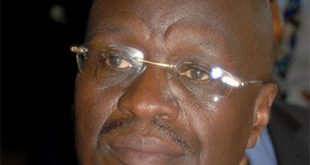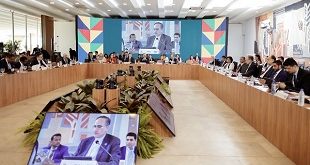
By Ike Okonta
The Central Bank governor exposed corruption in the Nigerian National Petroleum Corporation
It was only a matter of time before Nigerian President Goodluck Jonathan moved against Lamido Sanusi, the governor of the Central Bank of Nigeria, who spent much of the last year waging an anti-corruption campaign against the government. But, while Sanusi has been suspended, his corruption allegations cannot be withdrawn – and the public outcry that they have provoked cannot be silenced.
Sanusi’s crusade began with allegations that major government bodies were staffed by corrupt and incompetent officials. He raised the stakes last September, when he wrote a letter to Jonathan accusing the Nigerian National Petroleum Corporation (NNPC) of failing to remit $49.8 billion to government coffers – a scheme in which several senior government officials were complicit.
Three months later, the letter was deliberately leaked to the press. Newspaper editorials and outraged citizens called for a probe of the NNPC and demanded accountability for the officials involved. After a subsequent meeting with Nigeria’s finance and petroleum ministers, Sanusi said that he had misspoken: the NNPC had misappropriated only $12 billion. (Finance Minister Ngozi Okonjo-Iweala continued to insist that the correct figure was $10 billion, and that she had been aware of this long before Sanusi’s intervention.)
But, in early February, Sanusi revised his statement again, telling a committee of the Nigerian Senate that, after reviewing the figures again, he had concluded that the NNPC had failed to remit $20 billion. This time, he insisted, he was certain. He then submitted a detailed memorandum outlining the claim – and giving more ammunition to Jonathan’s critics.
Soon after, Jonathan suspended Sanusi, citing acts of “financial recklessness.” By stopping short of dismissing Sanusi outright, Jonathan managed to sidestep the requirement of two-thirds support in the 109-seat Senate. In order to defuse questions about the timing of the move, Jonathan’s office claimed that Sanusi had been under investigation for several months.
Sanusi was attending a conference in Niger when his suspension was announced. Upon his return to Nigeria, security officials seized his passport and detained him briefly. Following media speculation that the Economic and Financial Crimes Commission would question him further, and possibly detain him for an extended period, he obtained a court order restraining the government from breaching his right to freedom of movement, because he had not yet been charged with any crime.
For Jonathan, stopping Sanusi’s tirades against his administration and the NNPC – at least from the central bank’s bully pulpit – was a critical prerequisite to his reelection campaign. Indeed, he viewed Sanusi as a substantial enough threat to his prospects that he could not risk waiting until June, when Sanusi’s tenure as governor expired, to remove him. (And, with Sanusi now out of the way, Jonathan is unlikely to take any further steps against him.)
While Sanusi’s accusations have contributed to a consensus that Jonathan is a weak president who presides over an incompetent and corrupt government, public opinion remains sharply divided. Some consider Sanusi excessively voluble, and resent his liberal allocation of central-bank funds to causes of his choosing. In their view, the fact that the specifics of his accusations have changed reflects a recklessness that is inappropriate for the central bank governor.
But many others view Sanusi as the no-nonsense official who cleaned up the banking sector and staved off a financial crisis by removing several corrupt bank executives from power. Sanusi’s supporters also credit him with maintaining exchange-rate stability. In fact, Sanusi’s suspension spurred a financial-market panic, with the naira plummeting to a record low against the dollar, as foreign investors sold off bonds and equities.
Amid all of the controversy, one thing is clear: Nigeria’s government remains far from eliminating the rampant corruption that has plagued the country since independence. Sanusi did ordinary Nigerians a favor by highlighting the NNPC’s malfeasance. He had to pay for that with his job. The question now is whether he can help to ensure that Jonathan loses his.
Ike Okonta, an Abuja-based policy analyst and writer, is currently a fellow of the Open Society Institute, New York.
 The Independent Uganda: You get the Truth we Pay the Price
The Independent Uganda: You get the Truth we Pay the Price



